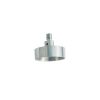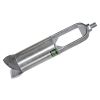AMS Professional Soil Sampling Kits
Features
- Components stronger and more durable than standard kit
- 3/4" threaded connection and 11 gauge cutting teeth
- Durable welds and extra tungsten carbide hard surfacing
- Expedited repair and warranty service
- Lifetime technical support
- More
Overview
The AMS Professional Soil Sampling kits have been made stronger and more durable than standard kit components. Professional kits feature the strongest, most durable connection type on augers, extensions, cross handles, slide hammers, and split-core samplers.
They feature the trusted AMS 3/4" threaded connection and have thicker (11 gauge) cutting teeth with stronger welds and extra tungsten carbide hard surfacing. They are also reinforced with extra gussets to prevent the bail from bending or twisting, which are welded at both the top and bottom of the bail.
Design
- The 3/4" threaded extensions are constructed of a larger 1" diameter chrome molybdenum tubing and are powder-coated safety orange for added rust resistance
- The 10 lb. professional series slide hammer has a 3/4"-diameter inner slide bar that makes it more reliable and prevents bending of the bar
- The professional series split soil core sampler includes a thicker (.800") top cap than the standard split soil core samplers
- The thicker top cap is designed to match up with the larger 3/4" threaded female connection of the professional series slide hammer to provide increased durability
- The cap works with standard split soil core sampler cup sets
- Split soil core sampler dimensions are based on the outer diameter of their liner
*Note: The outer diameter of the sampler can be up to 1/2" larger.
- (1) 3/4" threaded professional regular auger and mud auger (2 1/4" or 3 1/4")
- (3) 4' powder-coated extensions
- (1) 18" rubber-coated cross handle
- (1) 10 lb. slide hammer
- (1) Split-core sampler (2" x 6" or 1 3/8" x 6")
- (1) Plastic liner
- (2) End caps
- (1) Rock breaker kit
- (1) Cleaning brush
- (1) Universal slip wrench
- (2) 12" crescent wrenches
In The News
Farmer-invented automated soil sampler reduces human error
A North Carolina farmer has developed a mobile soil sampling system with virtually no risk of human error, Southeast Farm Press reported. Allan Baucom, a grain and cotton farmer with more than 6,000 acres around Monroe, N.C., built the automated soil sampler to keep up with his expanding agricultural operations -- and growing variety of soil types. Named “the Falcon”, the sampler can take up to 12 samples and once, and store 200 before being unloaded. Two Falcons currently exist: one works Baucom’s farm, while the other operates on farms around the country to ensure the sampler’s efficiency in different environments. The sampler is expected to be made available soon, and will host new features, such as computer-interfaced electronic system for use with a laptop or tablet.
Read MoreAmazon sediment studied through Andes trip down tributary
A team of researchers led by scientists from the University of South Carolina Dornsife traveled to the Peruvian jungle to understand how sediment and plant matter travel down the Andes Mountains and into the Amazon River system, according a first-person account from Sarah Feakins, assistant professor of earth sciences at USC Dornsife. The team focused on a tributary to the Amazon River, the Kosnipata River. They started at the headwaters, traveling up treacherous gravel mountain roads. They ended in the Amazonian floodplain, where Feakins said the river was orange from colloids in the soil. The team spent most of their time collecting and filtering water to obtain sediment samples. Feakins described the work as collecting by day and filtering by night.
Read MoreSafeguarding Communities with Real-Time Flood Monitoring in the City of Hazelwood
The City of Hazelwood is a suburb in St. Louis County, Missouri, home to around 25,500 people. Recently, the community has suffered increased flash flooding following severe storms, prompting the need for the installation of a flood monitoring system. In 2022, a NexSens X2 data logger was installed to monitor water level and rainfall in real-time, with the aim of reducing the loss of life and property as a result of extreme weather events. [caption id="attachment_39411" align="alignnone" width="940"] The latest flood event at Coldwater Creek, where the water level rose by 14 feet, exceeding the height of the X2 by three feet. The sensor can be seen behind the wall that usually contains the Creek.
Read More















